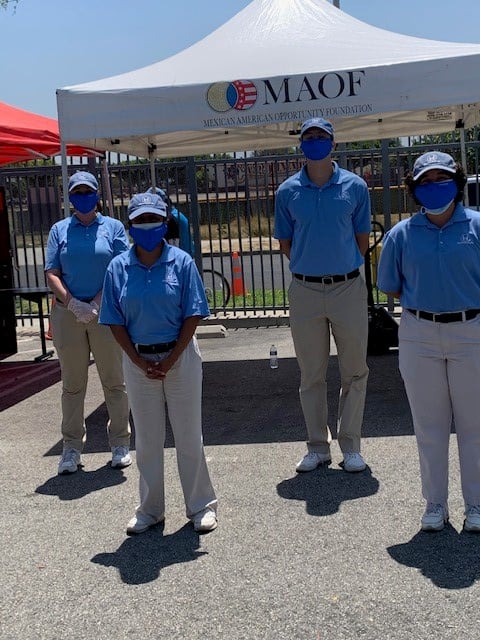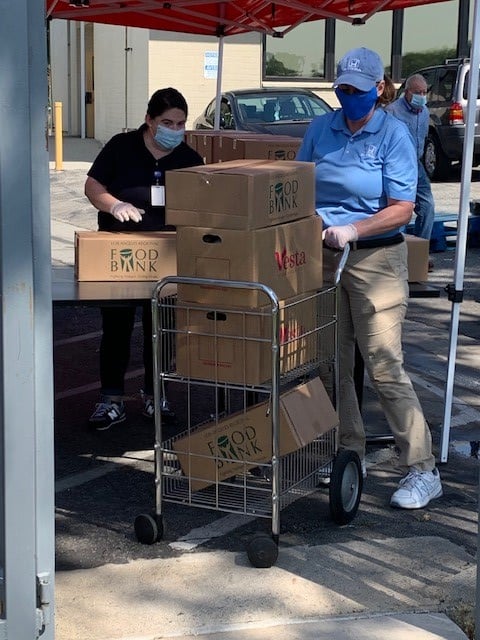
 The Mexican American Opportunity Foundation (MAOF) providing food assistance and support in East L.A.
The Mexican American Opportunity Foundation (MAOF) providing food assistance and support in East L.A.
Lessons From The Pandemic: Early Childhood Education Centers Face Their Toughest Test Yet
How one California organization is pivoting to provide greater financial literacy to entire families
When the Mexican American Opportunity Foundation (MAOF) was founded in 1963, its purpose was to provide career and education assistance to Mexican American families living in East Los Angeles. Nearly 60 years later, it has since evolved into a wide sweeping community organization providing numerous services to just about anyone in need who walks through its doors.
Even with the pandemic, MAOF has managed to figuratively keep its open door policy in place for the community, despite California’s repeated stay at home orders closing the Foundation’s physical doors.
Historically the core focus of the East LA based Foundation has revolved around early childhood education for pre-K children across California.
“I meet so many working professionals across Southern California who tell me they got their start at MAOF,” says Martin Castro, CEO of MAOF. “Our education and childcare programs provide such a tremendous service giving lasting opportunities for children. That’s what keeps us going.”
Before the pandemic, MAOF was running over 60 Early Learning Centers across seven counties stretching as far north as Monterey and as far south as San Diego. Here they provided Head Start early education and childcare to over 8000 children of underserved and low-income families preparing them for Kindergarten and beyond.
But when the pandemic struck last year in March, the Foundation was immediately forced to shut down all of its Early Learning Centers through state orders.
This had an immediate impact across the Foundation’s communities. But the Foundation moved quickly to ensure the children it served were still supported.
 The Mexican American Opportunity Foundation (MAOF) providing food assistance and support in East L.A.
The Mexican American Opportunity Foundation (MAOF) providing food assistance and support in East L.A.
Overnight, MAOF became one of East LA’s dedicated food banks for local families. Castro says since the start of the pandemic, the Foundation has been providing weekly food stuffs for nearly 500 families across the area.
“While our doors have been shut, we have welcomed the arrival of hundreds of cars each and every week to ensure children do not go hungry during the pandemic,” says Castro.
As MAOF pivoted towards food assistance, the Foundation also sought to expand its existing financial capability programs.
Throughout the pandemic MAOF has increased its financial literacy coaching, IRS volunteer tax assistance, lending circles and immigration services communicating with clients through email and phone consultation. Its financial literacy program, with support from JPMorgan Chase, has proved to be an invaluable service for the community as it has taught families how to budget their money in the face of mounting economic uncertainty.
“During this time we really have emphasized our financial coaching and literacy programs with families. With so many working parents facing constant questions around their job security, it is really important for us to support families so that they can understand how to better manage their budgets and incomes. Our programs encourage families to save their earnings for an emergency or a rainy day fund to help offset any potential job or income loss.” says Castro.
MAOF also provides a payday relief fund program for families. Castro explains that financial coaches at the Foundation will evaluate the financial conditions of families facing high interest short term loans or payday loans. Depending on a family’s situation they may be able to offer assistance to payoff these loans and to ultimately help families build back their credit.
In spite of all of these programs helping to uplift so many families across during this time, Castro remains worried about reaching all of the students MAOF once served.
Even after reopening their Early Learning Centers in October, MAOF cannot have more than 12 students in a classroom, about half of what they previously could accommodate because of social distancing guidelines and strict health and safety protocols in place. And even though MAOF now offers virtual learning experiences, Castro also worries about the significant number of students who do not have Wi-Fi access or even a family computer to use.
“Numerous studies show that children enrolled in pre-school programs will ultimately do better and they have a great shot to finish high school and enroll in college, years later,” says Castro. “If we fail to reach children by the age of six, we risk long term damage to their education. So the work that MAOF does is so important, it goes beyond our community and it must continue after the pandemic.”
